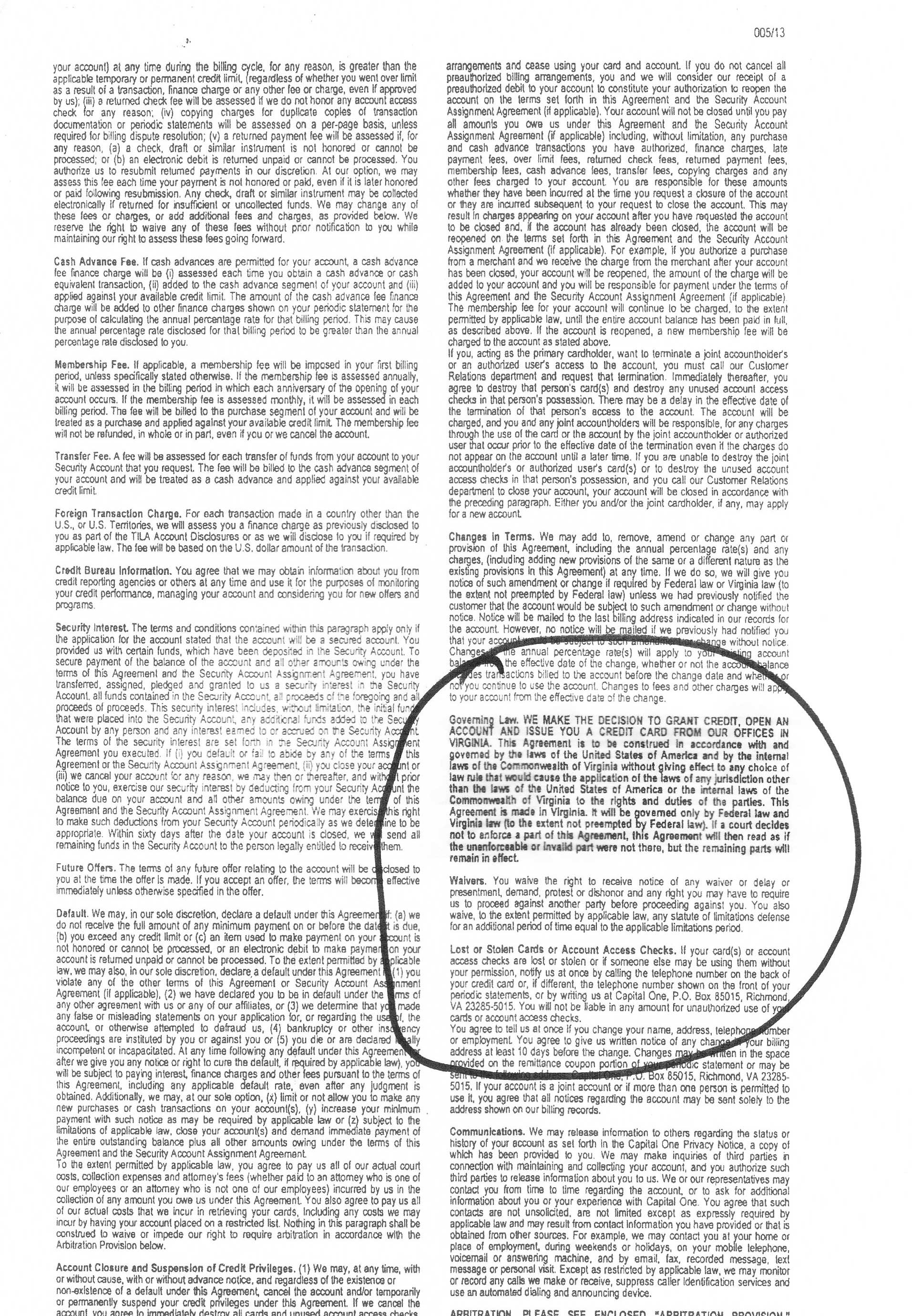Click here to see how I answered my Summons for less than $20
Capital One Credit Card Lawsuit Customer Agreement Virginia
“Applicable Law; Severability; Assignment. No matter where you live, this agreement and your account are governed by Federal Law and by Virginia law.”
Actions Barred by the Statute of Limitations
- The Supreme Court of Virginia recognizes that an open account is distinct from a contract by providing a choice of an open account or a contract on a warrant in debt. (see copy of the warrant in debt attached).
- This was an open account as there was a situation where there had been running or current dealings between the parties and the account had been kept open with the expectation of further dealings.
- The Virginia Legislature carved out a specific accrual time for an open account. Code of Virginia (1950) Section 8.01- 249 (see below)
- By so doing, and not addressing an open account in ‘ 8.01-246, the legislature thereby considers an open account to be distinct from a written contract, oral contract, quasi-contract or implied contract.
- From information and belief, the last charge for goods or services was April 2002.
- From information and belief, the last payment made by Defendant was May 3, 2002.
- • This action is time-barred by the Statute of Limitations § 8.01-246 as it has been longer than 3 years since either the last charge for goods or services or the last payment. Case filed October 16, 2006.
- In actions on an open account, [the accrual period begins] from the later of the (May 3, 2002) last payment or last charge for goods or services rendered on the account.
§ 8.01-246. Personal actions based on contracts.
1. In actions or upon a recognizance, except recognizance of bail in a civil suit, within ten years; and in actions or motions upon a recognizance of bail in a civil suit, within three years, omitting from the computation of such three years such time as the right to sue out such execution shall have been suspended by injunction, supersedeas or other process;
2. In actions on any contract which is not otherwise specified and which is in writing and signed by the party to be charged thereby, or by his agent, within five years whether such writing be under seal or not;
3. In actions by a partner against another for settlement of the partnership account or in actions upon accounts concerning the trade of merchandise between merchant and merchant, their factors, or servants, within five years from the cessation of the dealings in which they are interested together
4. In actions upon any unwritten contract, express or implied, within three years.
§ 8.01-249. When cause of action shall be deemed to accrue in certain personal actions.
The cause of action in the actions herein listed shall be deemed to accrue as follows:
1. In actions for fraud or mistake, in actions for violations of the Consumer Protection Act (§ 59.1-196 et seq.) based upon any misrepresentation, deception, or fraud, and in actions for rescission of contract for undue influence, when such fraud, mistake, misrepresentation, deception, or undue influence is discovered or by the exercise of due diligence reasonably should have been discovered;
2. In actions or other proceedings for money on deposit with a bank or any person or corporation doing a banking business, when a request in writing be made therefor by check, order, or otherwise;
3. In actions for malicious prosecution or abuse of process, when the relevant criminal or civil action is terminated;
4. In actions for injury to the person resulting from exposure to asbestos or products containing asbestos, when a diagnosis of asbestosis, interstitial fibrosis, mesothelioma, or other disabling asbestos-related injury or disease is first communicated to the person or his agent by a physician. However, no such action may be brought more than two years after the death of such person;
5. In actions for contribution or for indemnification, when the contributee or the indemnitee has paid or discharged the obligation. A third-party claim permitted by subsection A of § 8.01-281 and the Rules of Court may be asserted before such cause of action is deemed to accrue hereunder;
6. In actions for injury to the person, whatever the theory of recovery, resulting from sexual abuse occurring during the infancy or incapacity of the person, upon the later of the removal of the disability of infancy or incapacity as provided in § 8.01-229 or when the fact of the injury and its causal connection to the sexual abuse is first communicated to the person by a licensed physician, psychologist, or clinical psychologist. As used in this subdivision, “sexual abuse” means sexual abuse as defined in subdivision 6 of § 18.2-67.10 and acts constituting rape, sodomy, object sexual penetration or sexual battery as defined in Article 7 (§ 18.2-61 et seq.) of Chapter 4 of Title 18.2;
7. In products liability actions against parties other than health care providers as defined in § 8.01-581.1 for injury to the person resulting from or arising as a result of the implantation of any prosthetic device for breast augmentation or reconstruction, when the fact of the injury and its causal connection to the implantation is first communicated to the person by a physician;
8. In actions on an open account, from the later of the last payment or last charge for goods or services rendered on the account.
(Code 1950, §§ 8-13, 8-17, 8-23; 1964, c. 219; 1966, c. 118; 1977, c. 617.)
An open account under Virginia Law Statue of Limitations on an open account.
Is an open account the same as a contract? Is the statute of limitations different for the two?
See Below

How I beat Capital One in court
Related Posts